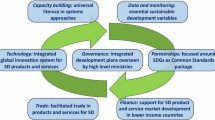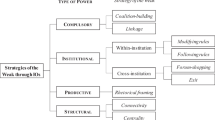Abstract
The Paris Agreement created an institutionalized role for non-state actors through voluntary cooperation. Many international NGOs (INGOs) are particularly active in these “Paris partnerships,” often working with multinational corporations to reduce emissions and promote decarbonization. Though there is ample work on both the effectiveness of the Paris partnerships and on the role of INGOs in the global climate regime, much of this work focuses “outward” – on how INGOs contribute to climate mitigation and adaptation, or influence norms, discourse and policy. Yet, there is considerably less work that focuses “inward” – examining who INGOs work with in order to achieve their policy goals. This paper provides a descriptive analysis of key INGOs in the United Nations Framework Convention on Climate Change (UNFCCC) process, as a first step in a larger research agenda to understand the incentives and opportunities that drive INGO behavior. Specifically, it uses network analysis to identify the “climate establishment” – which I define as the insider INGOs working within the multilateral process and with large corporations to influence rulemaking, soft law and firm behavior. Measures of network centrality demonstrate that two INGOs – WWF and the World Resources Institute – are by far, the most authoritative members of the climate establishment. They participate in the largest number of partnerships, and have “important” friends, as measured by eigenvector centrality. The data also indicate that the climate establishment sees carbon pricing as a key strategy, and it often cooperates with banks that are large funders of fossil fuel projects. The descriptive analysis of the climate establishment and its partners raises important questions for future research about why INGOs choose to partner with F100 companies, and how such cooperation might influence INGO behavior.



Similar content being viewed by others
Data availability
Network data are available upon request.
Notes
As of 31 July 2023. https://climateaction.unfccc.int/Initiatives.
The data is available at https://climateinitiativesplatform.org and was downloaded on October 21, 2021.
Many studies simply use “off the shelf” data, such as coding from the Yearbook of International Organizations (e.g. Pacheco-Vega and Murdie 2021). But this data does not include most of the organizations in my sample. Some of the most comprehensive work on international environmental NGOs relies either on inductive coding (Allan 2019) or coding of organizational attributes (Hadden 2015). In sum, there is no simple solution to the empirical question of “what counts as an environmental NGO?” (Bloodgood et al. 2023).
References
Abbott KW, Green JF, Keohane RO (2016) Organizational Ecology and Institutional Change in Global Governance. International Organization 70:247–277
Alcock F (2008) Conflicts and coalitions within and across the ENGO Community. Glob Environ Politics 8:66–91. https://doi.org/10.1162/glep.2008.8.4.66
Allan JI (2020) The New Climate activism: NGO Authority and Participation in Climate Change Governance. University of Toronto
Allan JI (2019) Dangerous Incrementalism of the Paris Agreement. Global Environmental Politics 19:4–11. https://doi.org/10.1162/glep_a_00488
Andonova LB (2010) Public-private partnerships for the Earth: politics and Patterns of Hybrid Authority in the Multilateral System. Glob Environ Politics 10:25–53
Andonova LB, Levy MA (2004) Franchising Global Governance: Making Sense of the Johannesburg Type II Partnerships. Yearbook of International Cooperation on Environment and Development 2003-04 19–31
Betsill MM, Corell E (eds) (2008) NGO Diplomacy: The Influence of Nongovernmental Organizations inInternational Environmental Negotiations. MIT Press, Cambridge, Mass
Borgatti SP, Everett MG, Johnson JC (2013) Analyzing Social Networks, 1 edition. SAGE Publications Ltd, Los Angeles
Bush SS (2016) The taming of Democracy Assistance: why Democracy Promotion does not confront dictators, reprint edition. Cambridge University Press
Bloodgood EA, Stroup SS, Wong WH (2023) What Counts? How to use Different Sources of NGO Data.Voluntas 34:126–132. https://doi.org/10.1007/s11266-021-00396-w
Carpenter RC (2007) Studying issue (Non)-Adoption in transnational advocacy networks. Int Org 61:643–667. https://doi.org/10.1017/S002081830707021X
Carpenter C, Duygulu S, Montgomery AH, Rapp A (2014) Explaining the Advocacy Agenda: insights from the Human Security Network. Int Org 68:449–470. https://doi.org/10.1017/S0020818313000453
Cooley A, Ron J (2002) The NGO Scramble: Organizational Insecurity and the political economy of transnational action. Int Secur 27:5–39
Colgan JD, Green JF, Hale TN (2021) Asset Revaluation and the Existential Politics of Climate Change.International Organization 75:586–610. https://doi.org/10.1017/S0020818320000296
Eilstrup-Sangiovanni M (2017) Global governance networks. In: Victor JN, Montgomery AH, Lubell M (eds) The Oxford Handbook of Political networks. Oxford University Press, Oxford, pp 690–714
Granovetter M (1985) Economic Action and Social structure: the Problem of Embeddedness. Am J Sociol 91:481–510
Green JF (2013) Order out of Chaos: Public and private rules for managing Carbon. Glob Environ Politics 13:1–25
Green JF (2014) Rethinking Private Authority: agents and entrepreneurs in Global Environmental Governance, Illustrated edition. Princeton University Press, Princeton
Green JF (2021) Does carbon pricing reduce emissions? A review of ex-post analyses. Environ Res Lett. https://doi.org/10.1088/1748-9326/abdae9
Green JF (2022) Hierarchy in Regime complexes: understanding Authority in Antarctic Governance. Int Stud Quart 66:sqab084. https://doi.org/10.1093/isq/sqab084
Green JF, Hadden J (2021) How did environmental governance become complex? Understanding Mutualism between Environmental NGOs and International Organizations. Int Stud Rev 23:1792–1812. https://doi.org/10.1093/isr/viab046
Hadden J (2015) Networks in contention: the Divisive politics of Climate Change. Cambridge University Press
Hafner-Burton E, Kahler M, Montgomery A (2009) Network Analysis for International Relations. Int Org 63:559–592
Hale T (2016) All hands on deck: the Paris Agreement and Nonstate Climate Action. Glob Environ Politics 16:12–22. https://doi.org/10.1162/GLEP_a_00362
Hale T (2020) Catalytic Cooperation. Glob Environ Politics 20:73–98. https://doi.org/10.1162/glep_a_00561
Hsu A, Moffat AS, Weinfurter AJ, Schwartz JD (2015) Towards a new climate diplomacy. Nat Clim Change 5:501–503. https://doi.org/10.1038/nclimate2594
Hsu A, Höhne N, Kuramochi T et al (2019) A research roadmap for quantifying non-state and subnational climate mitigation action. Nat Clim Change 9:11–17. https://doi.org/10.1038/s41558-018-0338-z
Hsu A, Höhne N, Kuramochi T et al (2020) Beyond states: harnessing sub-national actors for the deep decarbonisation of cities, regions, and businesses. Energy Res Social Sci 70:101738. https://doi.org/10.1016/j.erss.2020.101738
Huber MT (2022) Climate Change as Class War: Building Socialism on a Warming Planet. Verso
Kahler M (ed) (2009) Networked politics: Agency, Power and Governance. Networked politics: Agency, Power, and Governance. Cornell University Press, pp 1–23
Keck ME, Sikkink K (1998) Activists beyond borders: advocacy networks in international politics. Cornell University Press, Ithaca, N.Y.
Kuramochi T, Roelfsema M, Hsu A et al (2020) Beyond national climate action: the impact of region, city, and business commitments on global greenhouse gas emissions. Clim Policy 20:275–291. https://doi.org/10.1080/14693062.2020.1740150
Lake DA, Wong WH (2009) The politics of networks: interests, Power and Human Rights Norms. In: Kahler M (ed) Networked politics: Agency, Power, and Governance, Illustrated edition. Cornell University Press, Ithaca, pp 127–150
Lui S, Kuramochi T, Smit S et al (2021) Correcting course: the emission reduction potential of international cooperative initiatives. Clim Policy 21:232–250. https://doi.org/10.1080/14693062.2020.1806021
Mildenberger M, Stokes L (2020) The Trouble with Carbon Pricing. In: Boston Review. http://bostonreview.net/science-nature-politics/matto-mildenberger-leah-c-stokes-trouble-carbon-pricing. Accessed 25 Sep 2020
Mildenberger M, Lachapelle E, Harrison K, Stadelmann-Steffen I (2022) Limited impacts of carbon tax rebate programmes on public support for carbon pricing. Nat Clim Chang 12:141–147. https://doi.org/10.1038/s41558-021-01268-3
Montgomery AH (2016) Centrality in transnational governance: how networks of International Institutions shape power processes. In: Avant D, Westerwinter O (eds) The New Power politics: networks and transnational security governance. Oxford University Press, p 0
Newell PJ (2000) Climate for change: non-state actors and the global politics of the greenhouse. Cambridge University Press, Cambridge
New Climate Institute, EnviroLab D-D et al (2021) Utrecht University, Global climate action from cities, regions and businesses - 2021
Orsini A (2013) Multi-forum Non-state actors: navigating the Regime Complexes for Forestry and Genetic Resources. Glob Environ Politics 13:34–55. https://doi.org/10.1162/GLEP_a_00182
Pacheco-Vega R, Murdie A (2021) When do environmental NGOs work? A test of the conditionaleffectiveness of environmental advocacy. Environmental Politics 30:180–201. https://doi.org/10.1080/09644016.2020.1785261
Roelfsema M, Harmsen M, Olivier JJG et al (2018) Integrated assessment of international climate mitigation commitments outside the UNFCCC. Glob Environ Change 48:67–75. https://doi.org/10.1016/j.gloenvcha.2017.11.001
Raustiala K (1997) States, NGOs, and International Environmental Institutions. International StudiesQuarterly 41:719–740. https://doi.org/10.1111/1468-2478.00064.
Sabel CF, Victor DG (2022) Fixing the climate: strategies for an Uncertain World. Princeton University Press, Princeton
Sikkink K (2009) The Power of Networks in International politics. In: Kahler M (ed) Networked politics: Agency, Power, and Governance, Illustrated edition. Cornell University Press, Ithaca, pp 228–248
Skocpol T (2013) NAMING THE PROBLEM: what it will take to counter extremism and engage americans in the fight against global warming. Harvard University, Cambridge, MA
Stokes LC (2020) Short circuiting policy: interest groups and the Battle over Clean Energy and Climate Policy in the American States. Oxford University Press, New York, NY
Stroup SS, Wong WH (2017) The Authority trap: Strategic choices of International NGOs. Cornell University Press, Ithaca
Supran G, Oreskes N (2017) Assessing ExxonMobil’s climate change communications (1977–2014). Environ Res Lett 12:084019. https://doi.org/10.1088/1748-9326/aa815f
Supran G, Oreskes N (2021) Rhetoric and frame analysis of ExxonMobil’s climate change communications. One Earth 4:696–719. https://doi.org/10.1016/j.oneear.2021.04.014
Supran G, Rahmstorf S, Oreskes N (2023) Assessing ExxonMobil’s global warming projections. Science 379:eabk0063. https://doi.org/10.1126/science.abk0063
Teunissen A, Chan S (2023) Leveraging Enabling Power through Awarding in Global Climate Governance: Catalytic impacts of UNFCCC’s Global Climate Action Award. Glob Environ Politics 1–24. https://doi.org/10.1162/glep_a_00719
UNFCCC (2016) Report of the Conference of the Parties on its 21st Session
van der Ven H, Bernstein S, Hoffmann M (2016) Valuing the contributions of Nonstate and Subnational actors to Climate Governance. Glob Environ Politics 17:1–20. https://doi.org/10.1162/GLEP_a_00387
Vormedal I, Gulbrandsen LH, Skjærseth JB (2020) Big Oil and Climate Regulation: business as usual or a changing business? Glob Environ Politics 20:143–166. https://doi.org/10.1162/glep_a_00565
Willetts P (1996) The Conscience of the World. Brookings Institution, Washington, D.C
Williams EL, Bartone SA, Swanson EK, Stokes LC (2022) The American electric utility industry’s role in promoting climate denial, doubt, and delay. Environ Res Lett 17:094026. https://doi.org/10.1088/1748-9326/ac8ab3
Acknowledgements
I am grateful for comments and feedback from Michael Barnett, Steven Bird, Fergus Green, Tom Hale, Matt Hoffmann, Matt Huber, Paasha Mahdavi, Matto Mildenberger, Thea Riofrancos, Wendy Wong, members of the Comparative Political Economy Workshop at LSE, participants in the IR seminar at GWU, the environmental politics seminar at UCSB, and the 2021 Climate Futures Workshop. I also wish to acknowledge the outstanding research assistance by Louis Frank, Andreea Musulaan and Pietro Bonnacorsi, and the generosity of Jen Iris Allan in sharing her data with me. This research is supported by the Climate Social Science Network at Brown University.
Funding
This research is supported by the Climate Social Science Network at Brown University.
Author information
Authors and Affiliations
Contributions
I am the sole author of the paper.
Corresponding author
Ethics declarations
Ethics approval and consent to participate
Ethics approval not required for this research.
Consent for publication
I am able to grant consent for publication.
Competing interests
I declare no competing interests related to this research.
Additional information
Publisher’s Note
Springer Nature remains neutral with regard to jurisdictional claims in published maps and institutional affiliations.
Electronic supplementary material
Below is the link to the electronic supplementary material.
Rights and permissions
Springer Nature or its licensor (e.g. a society or other partner) holds exclusive rights to this article under a publishing agreement with the author(s) or other rightsholder(s); author self-archiving of the accepted manuscript version of this article is solely governed by the terms of such publishing agreement and applicable law.
About this article
Cite this article
Green, J.F. The Climate Establishment and the Paris partnerships. Climatic Change 177, 84 (2024). https://doi.org/10.1007/s10584-024-03730-5
Received:
Accepted:
Published:
DOI: https://doi.org/10.1007/s10584-024-03730-5




